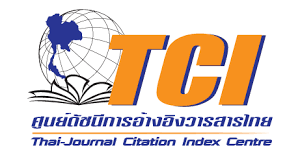ผลกระทบของการสอบบัญชีต่อการตกแต่งกำไรผ่านรายการค้าจริง
คำสำคัญ:
การตกแต่งกำไร, การสอบบัญชี, ขนาดของสำนักงานสอบบัญชีบทคัดย่อ
การวิจัยนี้มีวัตถุประสงค์เพื่อศึกษาผลกระทบของการสอบบัญชีโดยให้ความสนใจที่ขนาดของสำนักงานสอบบัญชีที่มีต่อการตกแต่งกำไรผ่านรายการค้าจริงซึ่งวัดจากความผิดปกติของรายการค่าใช้จ่ายตามดุลยพินิจของผู้บริหารโดยใช้ข้อมูลจากรายงานทางการเงินของบริษัทจดทะเบียนในตลาดหลักทรัพย์แห่งประเทศไทยระหว่างปี พ.ศ. 2557 - 2560 และทดสอบสมมติฐานด้วยเทคนิคเชิงปริมาณแบบการวิเคราะห์การถดถอยพหุคูณ ผลการวิจัยพบว่ากิจการที่ใช้บริการสอบบัญชีจากสำนักงานสอบบัญชีขนาดใหญ่นั้นมีระดับความผิดปกติของรายการค่าใช้จ่ายตามดุลยพินิจของผู้บริหารต่ำกว่ากิจการที่ใช้บริการสอบบัญชีจากสำนักงานสอบบัญชีอื่น ผลการวิจัยนี้สนับสนุนแนวคิดที่ปรากฏในวรรณกรรมทางบัญชีซึ่งเสนอว่าการใช้บริการสอบบัญชีจากสำนักงานสอบบัญชีที่มีชื่อเสียงและมีประสบการณ์นั้นช่วยลดแรงจูงใจในการตกแต่งกำไร อย่างไรก็ดีผลการวิเคราะห์เพิ่มเติมชี้ให้เห็นว่าเมื่อรูปแบบการตกแต่งกำไรผ่านรายการค้าจริงเปลี่ยนไปเป็นการตกแต่งกำไรผ่านรายการขายและการผลิต ขนาดของสำนักงานสอบบัญชีกลับไม่ได้มีผลกระทบต่อรูปแบบการตกแต่งกำไรผ่านรายการค้าจริงที่เป็นทางเลือกเหล่านั้น หลักฐานการวิจัยนี้สะท้อนให้เห็นว่ากลไกการกำกับดูแลรูปแบบเดียวไม่สามารถลดแรงจูงใจในการตกแต่งกำไรในทุกรูปแบบได้ ข้อมูลนี้มีความสำคัญอย่างยิ่งต่อหน่วยงานกำกับดูแลในการพิจารณาออกกลไกการกำกับดูแลที่เหมาะสมสำหรับการตกแต่งกำไรในแต่ละรูปแบบ
เอกสารอ้างอิง
Achleitner, A.-K., Günther, N., Kaserer, C., & Siciliano, G. (2014). Real Earnings Management and Accrual-based Earnings Management in Family Firms. European Accounting Review, 23(3), 1-31.
Alhadab, M., & Clacher, I. (2018). The impact of audit quality on real and accrual earnings management around IPOs. The British Accounting Review, 50(4), 442-461.
Alzoubi, E. S. S. (2018). Audit quality, debt financing, and earnings management: Evidence from Jordan. Journal of International Accounting, Auditing and Taxation, 30, 69-84.
Barnes, P. (2011). Minsky’s financial instability hypothesis, accounting information and the 2007–9 financial crisis in the UK and US. Accounting History, 16(4), 423-437.
Bumrungyat, N., & Sutthachai, S. (2016). A Relationship Between Real Activities Earnings Management and Debt Covenant Maintenance of Listed Companies in The Stock Exchange of Thailand. NIDA Business Journal 19(2016), 94-114.
Carney, R. W., & Child, T. B. (2013). Changes to the ownership and control of East Asian corporations between 1996 and 2008: The primacy of politics.(Report). Journal of Financial Economics, 107(2), 494-513.
Choi, A., Choi, J. H., & Sohn, B. C. (2018). The Joint Effect of Audit Quality and Legal Regimes on the Use of Real Earnings Management: International Evidence. Contemporary Accounting Research, 2225-2258.
Cohen, D. A., Dey, A., & Lys, T. Z. (2008). Real and accrual- based earnings management in the pre- and post- sarbanes- oxley periods. Accounting Review, 83(3), 757-787.
Cohen, D. A., & Zarowin, P. (2010). Accrual- based and real earnings management activities around seasoned equity offerings. Journal of Accounting and Economics, 50(1), 2-19.
Connelly, J. T., Limpaphayom, P., & Nagarajan, N. J. (2012). Form versus substance: The effect of ownership structure and corporate governance on firm value in Thailand. Journal of Banking and Finance, 36(6), 1722-1743.
Dechow, P. M., Sloan, R. G., & Sweeney, A. P. (1995). Detecting earnings management. Accounting Review, 70(2), 193-255.
Donelson, D. C., Ege, M., Imdieke, A. J., & Maksymov, E. (2020). The revival of large consulting practices at the Big 4 and audit quality. Accounting, Organizations and Society, 87(2020), 1-20.
Enomoto, M. (2018). Cross-Country Research on Earnings Quality: A Literature Review and Future Opportunities. IDEAS Working Paper Series from RePEc.
Francis, B., Hasan, I., & Li, L. (2016). A cross- country study of legal- system strength and real earnings management. Journal of Accounting and Public Policy, 35(5), 477-512.
Francis, J. R., & Wang, D. (2008). The Joint Effect of Investor Protection and Big 4 Audits on Earnings Quality around the World. Contemporary Accounting Research, 25(1), 157-191.
Goh, J., Lee, H. Y., & Lee, J. W. (2013). Majority Shareholder Ownership and Real Earnings Management: Evidence from Korea. Journal of International Financial Management & Accounting, 24(1), 26-61.
Graham, J. R., Harvey, C. R., & Rajgopal, S. (2005). The economic implications of corporate financial reporting. Journal of Accounting and Economics, 40(1), 3-73.
Hair, J. F., Black, W. C., Babin, B. J., & Anderson, R. E. (2006). Multivariate data analysis (6th ed.. ed.). Upper Saddle River, N.J. : Pearson Prentice Hall.
Hope, O.-K., Langli, J. C., & Thomas, W. B. (2012). Agency conflicts and auditing in private firms. Accounting, Organizations and Society, 37(7), 500-517.
Kim, J., Kim, Y., & Zhou, J. (2017). Languages and earnings management. Journal of Accounting and Economics, 63(2-3), 288-306.
Kothari, S. P., Mizik, N., & Roychowdhury, S. (2016). Managing for the Moment: The Role of Earnings Management via Real Activities versus Accruals in SEO Valuation [Article]. Accounting Review, 91(2), 559-586.
Kunsrison, R. (2020). The Consequences of Real Earnings Management on Future Firm Performance: The Case of Thai Listed Companies. Journal of Accounting Profession, 16(52), 95-119.
Kunsrison, R. (2021). Real Earnings Management: The New Strategy for Earnings Manipulation. KKBS Journal of Business Administration and Accountancy, 5(1), 135-149.
Lemma, T. T., Negash, M., Mlilo, M., & Lulseged, A. (2018). Institutional ownership, product market competition, and earnings management: Some evidence from international data. Journal of Business Research, 90, 151-163.
Maroun, W. (2019). Does external assurance contribute to higher quality integrated reports? Journal of Accounting and Public Policy, 38(4), 1-22.
Mellado-Cid, C., Jory, S. R., & Ngo, T. N. (2018). Real activities manipulation and firm valuation.(Author abstract). Review of Quantitative Finance and Accounting, 50(4), 400-427.
Nagar, N., Desai, N., & Jacob, J. (2021). Do Big 4 auditors limit classification shifting? Evidence from India. Journal of International Accounting, Auditing and Taxation, 42, Advance online publication. https://doi.org/https://doi.org/10.1016/j.intaccaudtax.2021.100376
Nuanpradit, S. (2018). The Relationship between Information Asymmetry and Real Earnings Management: The Role of CEO Duality in Thailand Journal of Business Administration, 41(158), 48-69.
Oz, I. O., & Yelkenci, T. (2018). Examination of real and accrual earnings management: A cross-country analysis of legal origin under IFRS. International Review of Financial Analysis, 58, 24-37.
Roychowdhury, S. (2006). Earnings management through real activities manipulation. Journal of Accounting and Economics, 42(3), 335-370.
Suksonghong, K., & Amran, A. (2020). Achieving earnings target through real activities manipulation: lesson from stock exchange of Thailand. International Journal of Monetary Economics and Finance, 13(3), 260-268.
Suphatranon, S. (2020). Financial Reporting Data Quality and Firm Growth: An empirical Investigation of Listed Firms in Thailand. Journal of Liberal Arts and Management Science Kasetsart University, 7(2), 17-29.
Teoh, S. H., & Wong, T. J. (1993). Perceived Auditor Quality and the Earnings Response Coefficient. The Accounting Review, 68(2), 346-366.
Vorst, P. (2016). Real earnings management and long-term operating performance: the role of reversals in discretionary investment cuts.(Report). Accounting Review, 91(4), 1219-1256.
Zang, A. Y. (2012). Evidence on the Trade-Off between Real Activities Manipulation and Accrual-Based Earnings Management [Article]. Accounting Review, 87(2), 675-703






